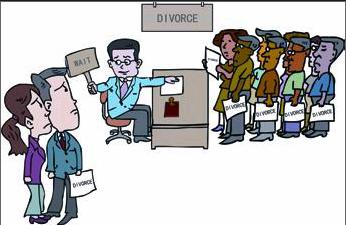Will the Divorce Registration Quota Save Marriages?
2015-09-02

Recently, couples desiring to untie the knot in Guangzhou, south Chinas Guangdong Province, have had to wait up to a month to be granted a divorce, as civil affairs authorities there have been short-staffed owing to the multitude of couples. Since daily divorce registration numbers are limited, if couples cant make it into the quota for the day, they simply have to wait.
The fact is that divorce is sweeping through China. According to recent statistics from the Ministry of Civil Affairs, the divorce rate has been rising over the past 12 years in China since 2003, resulting in some Chinese cities setting a quota on the number of permitted divorces per day.
Some have claimed that this measure prevents more families from breaking up, as its believed that many young couples make an impulse decision when seeking a divorce. Others, however, argue that the practice interferes with the freedom to divorce and can hardly be expected to help save marriages.
A well-intentioned policy
Zhang Li (Zhejiang Daily): Most divorces we see nowadays result from young couples impulsivity, with simple procedures fueling breakups. If divorce proceedings are more complex, the couples in question will likely spend more time reexamining their marriages, and many of them may choose not to get divorced.
Its easy for a marriage to break up, but its not easy to build a new family that operates properly. The divorce registration quota is an attempt to save marriages. If civil affairs bureaus can provide more services such as psychological consultations, couple breakups may become less common.
Lei Zhenyue (Jianghai Evening News): The divorce registration quota has been adopted to delay rather than restrain divorces. It is an attempt to offer couples more time to contemplate their marriages in order to deter breakups driven by spontaneity.
Young people today tend to give priority to their own emotional demands, while neglecting their responsibility to their families. Particularly, couples born in the 1980s and 1990s are slow to play their new roles in the newly formed family. They continue to live as they did in their own families, feeling free to do whatever they want. As a result, conflicts often emerge between spouses as well as between young couples and other family members. If these young couples are not used to pondering over the reasons for the conflicts, of course theyll see divorce as the only option.
There are cases where young couples quarreled, got divorced and began to regret their decisions shortly after. Even in such cases, pride will prevent them from admitting the huge mistakes they have made, and they will have to move on in regret, with their families now broken. The ease of the divorce process is somewhat fueling the divorce craze.
